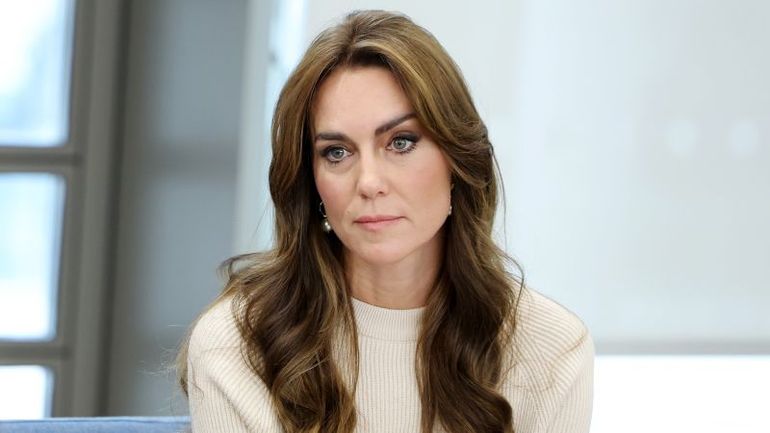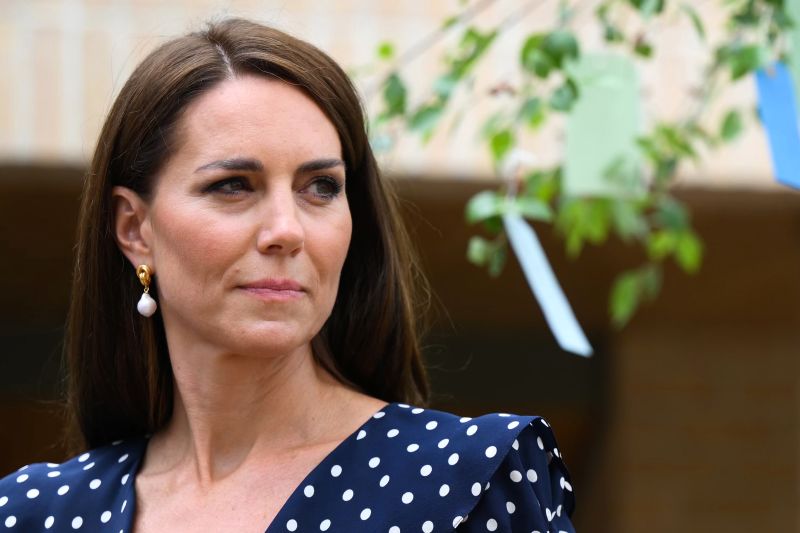
Debunking Kate Conspiracy Theories: Unraveling the Truth Behind Speculations

Amidst a wave of wild speculations circulating online, the reality behind Catherine, Princess of Wales' absence from the public eye was finally unveiled. Contrary to the elaborate conspiracies, she bravely disclosed her battle with cancer, initiating treatment while ensuring her children were aware of the situation.
The truth turned out to be less mysterious than people had speculated. After much speculation and rumors surrounding why Princess Catherine had been absent from the public eye for so long, she finally shared the reason: she had been diagnosed with cancer, was undergoing early stages of treatment, and had taken time to inform her children.
These past three months have been a time of crisis for Kate and her family. However, for some, it may have presented new opportunities.
According to Martin Innes, a disinformation expert at Cardiff University in Wales, a swirling mess of speculation creates an ideal environment for foreign actors to get involved. Innes and his research team discovered 45 social media accounts spreading false information about the princess, linking them to a Kremlin-affiliated disinformation campaign. This campaign has previously spread conspiracies about Russia's war in Ukraine and French President Emmanuel Macron. The main goal of these campaigns, according to Innes, is to destabilize Russia's Western adversaries and undermine trust in their institutions.
The relationship between the United Kingdom and Russia has always been a complex one. Despite tensions between London and Moscow, the Brits have been willing to provide services for and welcome the wealth of oligarchs from the former Soviet Union. In 2020, a UK parliamentary report highlighted significant evidence of Russian interference in the country's democratic processes, with Russian influence being described as the "new normal."
Since 2018, researchers in Cardiff have been conducting a comprehensive research program on disinformation. Their interest in the Kate conspiracies was sparked by unusual patterns in traffic data and sudden spikes that seemed to appear out of nowhere.
Innes mentioned that the accounts were not creating their own posts, but instead were commenting on posts related to the Princess of Wales story. They were sharing information about the Ukraine war, speaking negatively about Ukraine, or praising the fairness of the Russian elections.
This behavior was familiar to Innes's team, as they had previously studied a group of Russian actors who exhibited the same patterns.
The group known as "Doppelganger" is connected to the Kremlin and has been targeting audiences in the US and Europe, as well as Ukraine. According to Innes, it is a commercial firm hired to carry out disinformation campaigns. In late 2022, Meta, the company that owns Facebook and Instagram, issued a warning about Doppelganger mimicking prominent news sources and producing fake articles.
Kate's announcement of her cancer is broadcast as people watch at a pub in London, March 22, 2024.
Kate's announcement of her cancer is broadcast as people watch at a pub in London, March 22, 2024.
Aaron Chown/Press Association/AP
Meta admitted causing disruption within the group, but their disinformation tactics have become more advanced. Recently, the US Treasury imposed sanctions on two Russians and their companies linked to Doppelganger, accusing them of managing a network of over 60 websites spreading disinformation for the Russian government.
New conspiracies can emerge at any time. Just last month, the British Embassy in Moscow had to address false rumors about King Charles III that were circulating widely on Telegram and in the Russian media.
Often, groups aim to spread stories that are already causing division. According to Innes, the Kate rumors were an easy target for the campaign because many people in the Western public were already thinking in a conspiratorial way.
Rasmus Kleis Nielsen, the director of the Reuters Institute for the Study of Journalism at Oxford University, said that disinformation campaigns always focus on topics that are engaging and divisive. They make people question the credibility and trustworthiness of the information they come across. However, Nielsen also mentioned that it is unclear how effective these campaigns are, as most people are skeptical of the information they see online.
When Kensington Palace revealed in January that Kate had undergone scheduled abdominal surgery, the news initially surprised rather than raised suspicion among the public in Britain. However, as the weeks went by with Kate remaining out of the spotlight, rumors and speculation only grew stronger.
Catherine, Princess of Wales reacts during a visit of the new facilities of "Hope Street" during its opening on June 27, 2023 in Southampton, England. Hope Street is a residential community developed by One Small Thing, which is piloting a new approach to supporting women in the justice system.
Catherine, Princess of Wales was seen showing her reaction while visiting the newly opened facilities of "Hope Street" on June 27, 2023, in Southampton, England. "Hope Street" is a residential community established by One Small Thing, an organization testing out a fresh method to assist women in the justice system.
The image shows Catherine, Princess of Wales, engaging with the community members and staff during her visit to "Hope Street." Daniel Leal/WPA Pool/Getty Images
Related article
Kate’s cancer revelation throws royal family into fresh turmoil
Amateur sleuthing on social media turned into full-blown conspiracism after the palace shared a photo of Kate and her three children on Mother's Day. Instead of dispelling the rumors, the photo only added fuel to the fire. Public observers quickly noticed various discrepancies in the image, such as blurs on a sleeve cuff and a misaligned zipper.
In just a few hours, several global news agencies retracted the image due to concerns about potential manipulation. The next morning, Kate took responsibility and admitted, "Like many amateur photographers, I do sometimes experiment with editing."
Anna George, a researcher at the Oxford Internet Institute specializing in online disinformation, mentioned to CNN that Russian disinformation campaigns aim to create confusion about who can be trusted. She also suggested that the recent incident may have given the Kremlin a reason to accuse British institutions of spreading fake news.
According to Timothy Snyder, a historian from Yale University, Russian President Vladimir Putin maintains his power through a tactic called "strategic relativism." Instead of improving his own country through domestic policies, he focuses on making other countries appear worse, thereby boosting Russia's reputation by weakening others.
The Russian Foreign Ministry criticized the mistake with Kate's photo, accusing the British media and political system of working together to spread falsehoods.
In a sharp statement, the ministry pointed out that the princess's extended absence from public view shed light on the corrupt nature of the British political establishment. They claimed that the establishment sought to control public opinion through manipulation of the media and dissemination of fake news.
Police officers stand guard outside the London Clinic, where Kate underwent surgery in January.
Police officers stand guard outside the London Clinic, where Kate underwent surgery in January.
Henry Nicholls/AFP/Getty Images
In the days after the Mother’s Day photo, Kate was seen with her husband, Prince William, at a farm shop in Windsor near their home on March 19.
Innes and his researchers noticed a sudden increase in activity on X, previously known as Twitter, which he believed was linked to Doppelganger. He mentioned that all the identified accounts had similar names, were created at the same time, had few followers, and were working together.
According to Innes, the 45 accounts followed a specific naming pattern, starting with either the letter A or B, such as 'Aardvark56'. This naming convention helped them confirm the identity of the individuals responsible for the coordinated behavior.
SIGN UP FOR OUR FREE ROYAL NEWSLETTER
• Stay in the loop with CNN’s Royal News, a weekly newsletter that gives you exclusive insights into the royal family, their public engagements, and the latest buzz from behind palace walls.
The timing of the Kate conspiracies worked in favor of the Kremlin. This happened just as Putin was securing his fifth term in power in an election that lacked credible opposition. Innes mentioned that bots jumped in on posts discussing Kate's health, emphasizing the legitimacy of the Russian vote.
Innes described the conspiracy targeting the British establishment as occurring at a favorable time for Russia. This created a "goldilocks zone" for individuals connected to the Kremlin.
They were strategically aiming to spread their messages about the Russian elections and Ukraine in the Western media. This story was particularly advantageous for them because it helped them achieve their ultimate goal of destabilizing the UK and its Western allies.
Editor's P/S:
The article delves into the intriguing interplay between disinformation and the British royal family. It exposes how foreign actors, particularly those linked to Russia, exploit moments of uncertainty and speculation to spread false narratives. The case of Princess Catherine's cancer diagnosis illustrates how rumors and conspiracies can be amplified and weaponized to undermine trust in institutions.
The article raises concerns about the potential impact of disinformation on public discourse and democratic processes. It highlights the need for vigilance and critical thinking when consuming information, especially online. By understanding the tactics used by those seeking to manipulate public opinion, we can better safeguard the integrity of our institutions and protect ourselves from the harmful effects of disinformation. destabilize Western adversaries and weaken their alliances, a strategy that has become increasingly prevalent in recent years.









